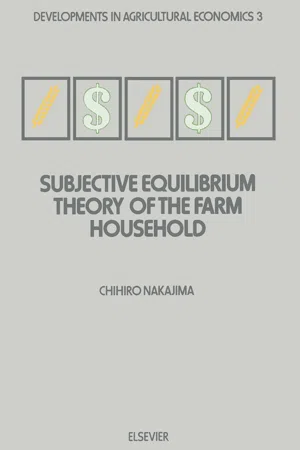
- English
- PDF
- Available on iOS & Android
Subjective Equilibrium Theory of the Farm Household
About this book
It is obvious that most of the agricultural production in the world is under the control of farm households (or family farms). This book aims to translate the characteristics of the farm household as an economic entity, into an economic theory. The book was originally written in Japanese, but various modifications have been made and new information added to the English version. The author defines the farm household as an economic entity which is a complex of the farm firm, the labourer's household and the consumer's household, and whose behavioural principle is utility maximization. The main purpose of the book is to construct a theoretical model of the decision-making behaviour of the farm household. For this purpose the method of subjective equilibrium analysis, which was used by J.R. Hicks for the consumer's household and the firm in Value and Capital, has been applied to the farm household. The major motif of the book may therefore be called ``Hicksian motif''. In analyzing the subjective equilibrium of the farm household, this book extends the Marshallian concepts of consumer's surplus and producer's surplus, by developing the three new concepts of labourer's surplus, self-employed producer's surplus and consumer's surplus. The analyses using the five concepts of economic surplus are the minor motif of the present book, which the author calls ``Marshallian motif''.Another important characteristic of this book lies in the presentation of newly developed theories of land rent. The author has tried to integrate the theory of leasehold tenancy (i.e. fixed rent tenancy) and that of share tenancy with subjective equilibrium theory of the farm household. In his foreword, John W. Longworth of the International Association of Agricultural Economists says ``From time-to-time an academic treatise appears which is truly different. This is one such book. It presents a self-contained normative theory of the farm household which is much more than just an elegant development of Hicksian and Marshallian ideas. Professor Nakajima introduces new concepts and develops a simple model of the farm household. He then extends this model in various ways to examine the subjective equilibrium of farm households under a wide range of economic circumstances. The exposition is clear and logic with each step in the argument explained in detail using both rigorous mathematical notation and easy to follow diagrams... With this book Nakajima is making his Life's Work available to non-Japanese Agricultural Economists. The international profession of Agricultural Economics will be richer for it.''
Frequently asked questions
- Essential is ideal for learners and professionals who enjoy exploring a wide range of subjects. Access the Essential Library with 800,000+ trusted titles and best-sellers across business, personal growth, and the humanities. Includes unlimited reading time and Standard Read Aloud voice.
- Complete: Perfect for advanced learners and researchers needing full, unrestricted access. Unlock 1.4M+ books across hundreds of subjects, including academic and specialized titles. The Complete Plan also includes advanced features like Premium Read Aloud and Research Assistant.
Please note we cannot support devices running on iOS 13 and Android 7 or earlier. Learn more about using the app.
Information
Table of contents
- Front Cover
- Subjective Equilibrium Theory of the Farm Household
- Copyright Page
- Table of Contents
- Foreword
- Preface
- Chapter 1. Introduction
- Chapter 2. Utility Function of the Farm Household
- Chapter 3. Subjective Equilibrium of the Farm Household in Basic Models
- Chapter 4. Effects of Parameter Changes on Subjective Equilibrium of the Farm Household in Basic Model
- Chapter 5. Subjective Equilibrium of the Robinson Crusoe-Type Farm Household
- Chapter 6. Subjective Equilibrium of the Farm Household Facing Markets for Factors of Production
- Chapter 7. Subjective Equilibrium of the Farm Household Consuming a Portion of its Output
- Chapter 8. Comparison of Subjective Equilibriums of Various Economic Entities with Subjective Equilibrium of the Farm Household
- Chapter 9. Alternative Diagrammatic Representations of Subjective Equilibrium of the Farm Household, and its Product Supply Curve
- Chapter 10. Fixed Rent, Share Rent, and Subjective Equilibrium of the Farm Household
- Chapter 11. Fixed Rent, Share Rent and Subjective Equilibrium of the Farm Household
- Chapter 12. Some Applications of Subjective Equilibrium Theory of the Farm Household
- Index